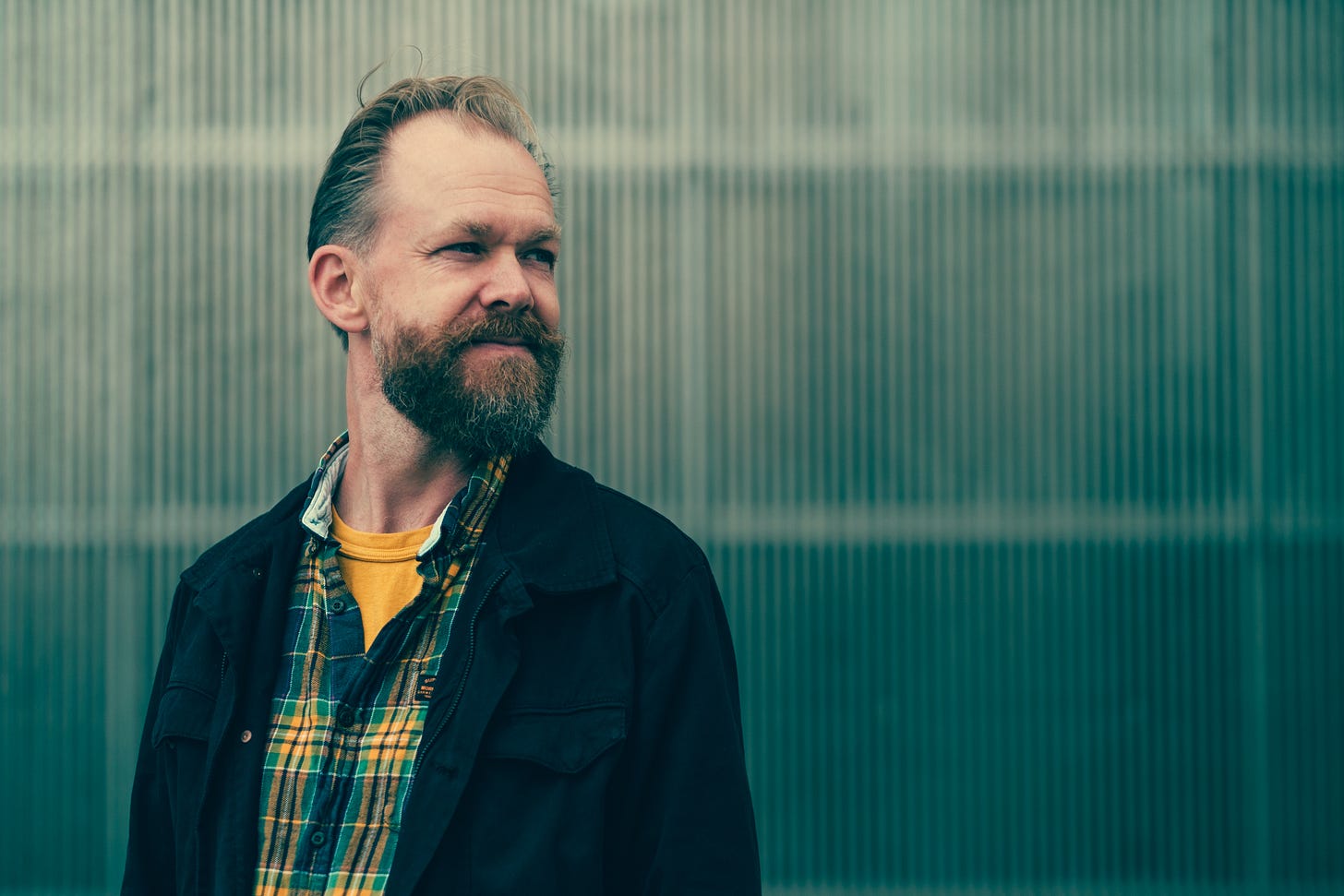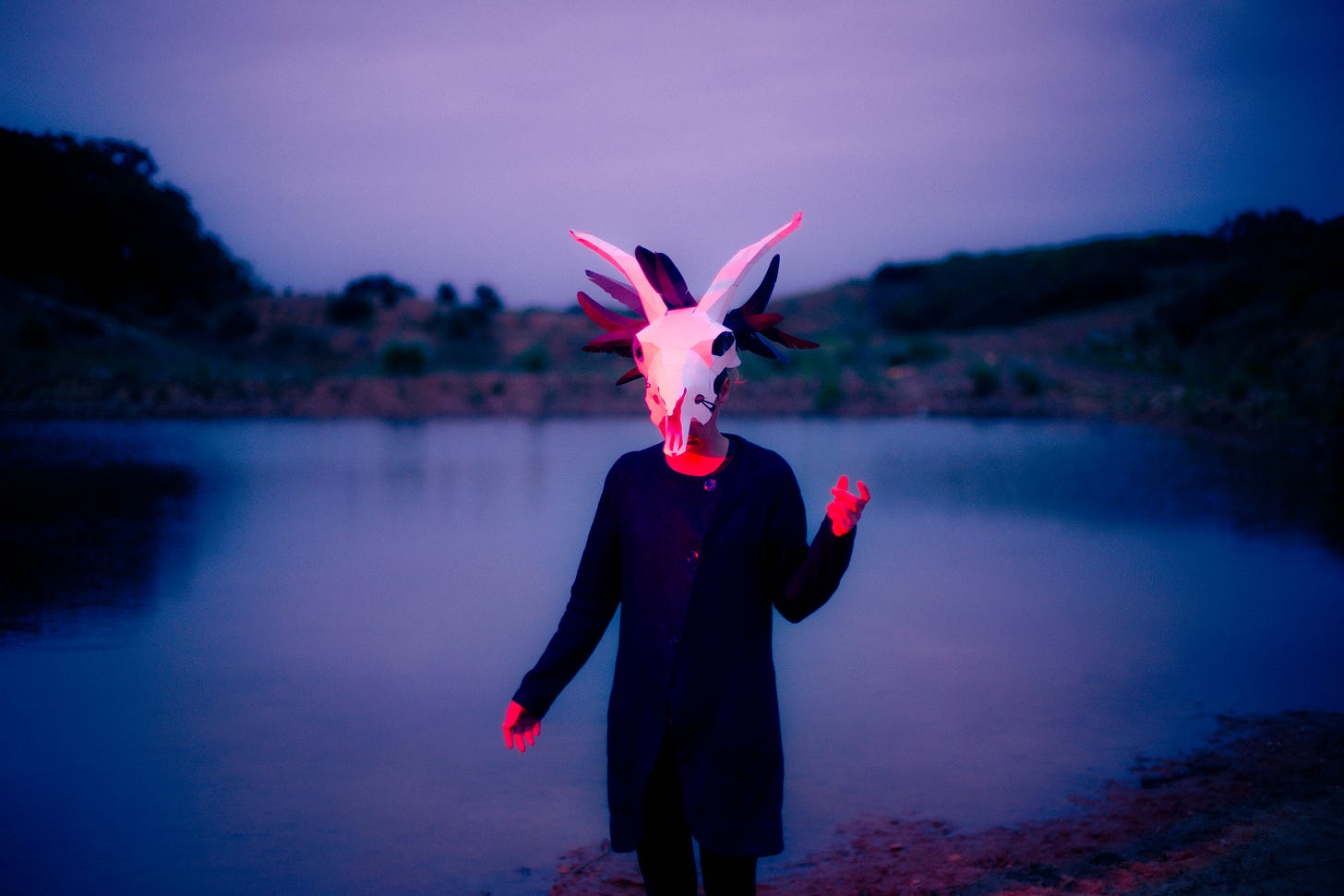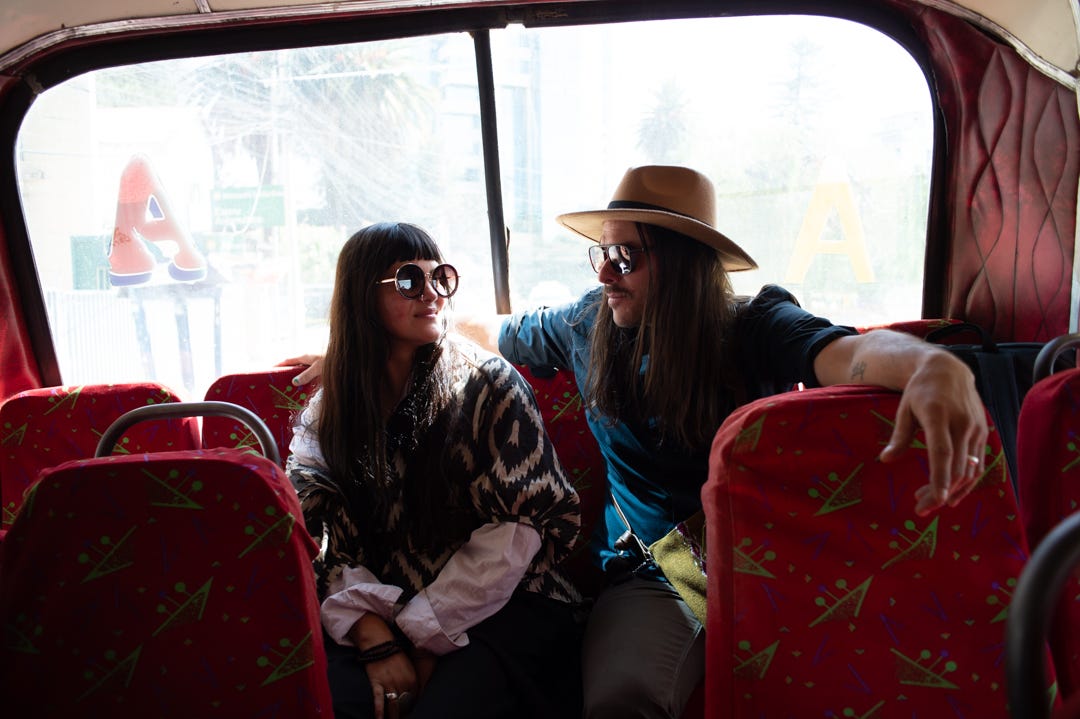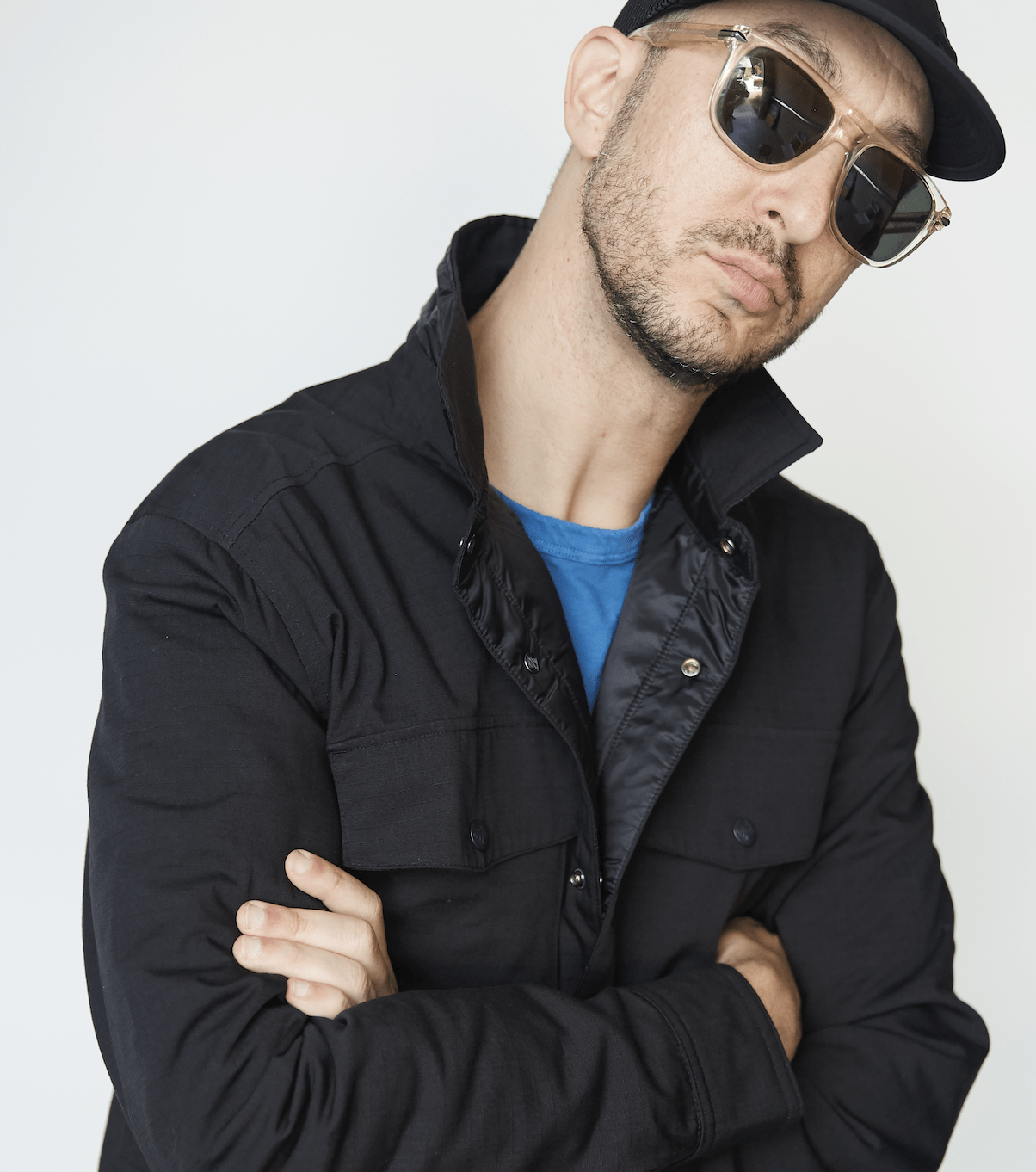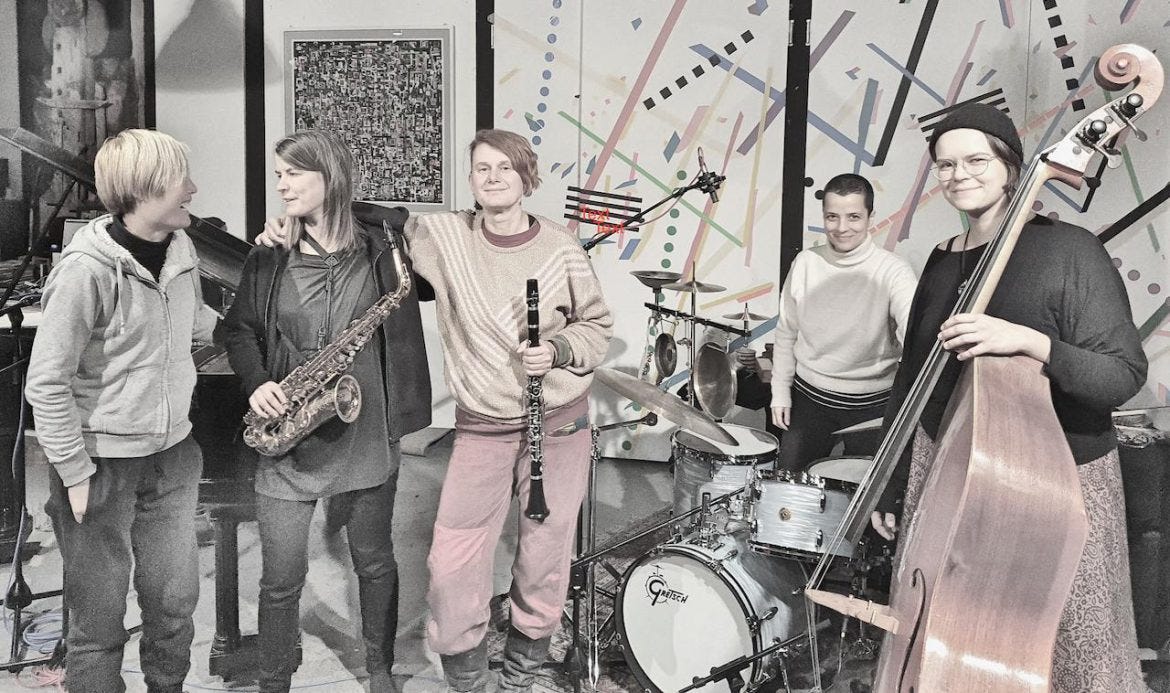Sound Spill
Øyvind Torvund, Ruth Goller, Cassie Kinoshi, Ibelisse Guardia Ferragutti & Frank Rosaly, Steve Lehman, SORBD
Øyvind Torvund’s Warped Pleasure Principal
In late April I attended the Only Connect Festival in Oslo, encountering a typically diverse, imaginative program that recognized the crumbling walls between disparate approaches in contemporary music. I heard a bunch of swell things, including a raucous duo between saxophonist Mette Rasmussen and British turntablist Mariam Rezai, a shimmeringly beautiful collaboration between guitarist Jules Reidy and the Pitch, and “Swim,” yet another stunning work from the London-based Canadian composer Cassandra Miller, deftly conducted by Ilan Volkov. I also got to enjoy my second encounter with Plans for Future Operas, a typically playful, multi-faceted work by Norwegian composer Øyvind Torvund. The piece was masterfully performed by keyboardist Mark Knoop and singer Juliet Fraser, and the wry humor of the piece connected far more with the Norwegian audience than it did with listeners in Berlin, where I first heard it, as part of MaerzMusik in March of 2023. One of Torvund’s most fertile gambits is transforming hilarious brainstorming sessions into provisional fantasias that can serve as the backbone of an entire work—like this collection of absurdist vignettes, enhanced by projections of his own hand-drawn sketches of proposals like “a collaboration between a furry monster and a soprano.” He perpetually tweaks the line between the absurd and the possible.
I’ve written often about Torvund’s 2019 release The Exotica Album (Hubro), one of my favorite works of the last decade, which collides the lush orchestrations of the short-lived genre—particularly the gorgeous arrangements of Les Baxter—with wry humor manifested in synthesizer passages created by Jørgen Træen that simulate field recordings of musical birds or conjure violent tropical storms. Rarely has a contemporary piece of music balanced humor, kitsch, and post-modern smarts with such craftsmanship, humility, and pleasure. Those qualities resurface on Torvund’s recent orchestral portrait album with the Oslo Philharmonic, A Walk Into the Future (Aurora), featuring pieces that preceded and followed The Exotica Album. The collection opens with the 12 movements of “Sweet Pieces,” mostly concise vignettes constructed around a well-formed aesthetic, although there are a few of them that stretch out to five or six minutes. Torvund is a masterful arranger and his string writing is lush, conjuring the most florid, full-bodied sounds, somewhere between 50s easy listening and pure romanticism. Torvund is clearly well-aware of the potential kitsch factor in this work, but his appreciation for this particular aesthetic is sincere. He is not making fun of the tradition, but he gleefully fucks around with it. As Jennifer Gerstin astutely points out in her liner note essay Torvund loves blurring the line between the artificial and the organic, a sleight of hand that goes both ways, with an orchestra sounding like a bird or a volcano, and a synthesizer—also wielded here by Træen—imitating conventional symphonic timbres. It’s another manifestation of the composer’s delight in asking lots of questions or wondering about potential experiments, no matter how absurd they may be. In an era when so much contemporary music is built upon queries both pompous and inconsequential, it’s a joy to encounter a composer who simply lets his imagination and sense of humor run wild. It’s even more joyful when the rigorous results induce such pleasure.
While nothing here quite matches the conceptual power and formal cohesion of The Exotica Album, I’ve had a blast getting lost in this latest Torvund salvo. The 2017 work Archaic Jam lays out its idea quite plainly, conceiving of an absurd jam session between an orchestra, a synth player, and an excessive electric guitar soloist, no more, no less. It’s fun, but it’s probably the least convincing piece in this particular area of exploration. He nails the lumpy, often meandering feel of a jam session, and while the ingredients are unusual, I’d rather hear Torvund pour those inventive energies into something that aims a bit higher, such as the piece that follows, “Symphonic Poem no 1 - Forest Morning,” a kind of sound poem beginning with break of dawn to capture nature rousing with the rising sun. As usual, Torvud deploys bits of extended technique to mimic sounds of nature, and, in fact, just about every gesture or sound, no matter how ridiculous, fits into the bigger picture of the composition. Check it out below. The album concludes with the title piece, which isn’t much more futuristic than anything else here, even if there are more overt splashes of analog synthesizer, sci-fi film tropes, and a kind of feverish chaos that expresses uncertainty about what comes next.
International Anthem’s Global Outreach
Scottie McNiece launched the International Anthem label in Chicago a decade ago with David Allen after stumbling into and falling hard for the city’s improvised music scene. Early on the imprint focused on a small constellation of players he’d encountered as a bartender, specifically trumpeter Rob Mazurek, but as the imprint’s early success with artists like cornetist jaimie branch and drummer Makaya McCraven began to earn attention in the US and Europe, the label’s roster began to expand. Although NcNiece now lives in Los Angeles—home to a slew of artists affiliated with the label including guitarist Jeff Parker and percussionist Carlos Niño—Chicago remains the imprint’s spiritual home, even if, these days, more of its artists are based in London. This week 90mil hosts a two-night celebration of the label’s ever-expanding community where players from Chicago, London, Amsterdam, LA, and Berlin will come together in ad hoc groups to say nothing of Mestizx, the project led by drummer Frank Rosaly and singer-keyboardist Ibelisse Guardia Ferragutti, along with some fellow travelers like Maurice Louca, Maurico Takara and Carla Boregas. Although I’ve listed the latest line-up info I had at the time, I would fully expect lots of the sets to feature additional members and lots of cameos.
Electric bassist Ruth Goller, who recently released her second album Skyllumina for the label, will play duo sets each night, partnering with London saxophonist Cassie Kinoshi on Tuesday and Chicago bassist Matthew Lux on Wednesday. Those pairings are a bit surprising since Goller’s new record features duos with a wide array of percussionists. She’s originally from Italy, but since moving to England nearly two decades ago Goller has become a ubiquitous presence, aligned with the label’s erasure of genre lines. She was a member of Vula Viel, a trio with percussionist Bex Burch—another IA artist who now lives in Berlin, and who will perform with Laurel Pardue, a violinist with deep investment in music technology, on Tuesday—as well as groups like Melt Yourself Down and Acoustic Ladyland. More recently she’s worked regularly with keyboardist Kit Downes and saxophonist-singer Alabaster DePlume, yet another IA artist. On her debut solo album Skylla she employed different tunings on her electric bass as a way of resisting patterns or licks, relying on her ears rather than familiar tropes, while overdubbing often wordless, abstract vocal lines.
Goller’s compositions feel more like sketches or vignettes, and while she isn’t a great singer, she works around those limitations by layering the vocal lines into ethereal sound lattices that cast a hypnotic, almost ethereal spell. The guest musicians on the new record give her music a dynamic boost without altering her delicate sound world. Most of the guests retain the same hushed vibe, privileging tactile cymbal work and snare patter more than heavy grooves, whether it’s the skittery lines of Tom Skinner, the metallic resonances of Mark Sanders, or the improvisatory, beat-spreading fabrics of Max Andrzejewski—who has worked with the bassist in his duo project Training. Among the other participants are Jim Hart, the final third of Vula Viel, Rosaly, Will Glaser, Emanuele Maniscalco, and Sebastian Rochford. Below you can hear the gentlest and most tuneful song on the record, “She was my own she was myself,” which features Burch on sanza and llimba, and Goller playing arco double bass.
I find that many of the most celebrated figures on London’s new jazz scene to be fueled by hype more than substance, but saxophonist and composer Cassie Kinoshi seems like the real deal. She initially made her mark as a member of Kokoroko, but I first heard her in the context of her ensemble, seed, a mid-size band rooted in 70s jazz verities with a strong injection of sleek but subtle soul. It’s not really my thing, but her rigor and vision are quite clear. Earlier this year Kinoshi dropped gratitude, an ambitious suite named for a practice of her mother’s in which she consciously takes note of every act of grace or object of natural beauty she felt grateful for in the face of life’s everyday difficulties. The saxophonist enhanced her own ten-member ensemble with turntable artist NikNak and five additional musicians from the London Contemporary Orchestra, broadening the already rich palette in play on the group’s 2019 debut Driftglass. Her writing and arranging are impressive, but her presence as an alto saxophonist is muted, so I’m excited to hear with Goller on Tuesday, where her playing will be a vocal point. Below you can hear the fourth movement of the piece, where we get a fleeting glimpse of the leader’s fiery playing.
The single set I’m most looking forward to is from Rosaly and Ferragutti, who will play music from their elegant Latinx-steeped art-pop album Mextizx, the non-gendered term for a mixed-race person. The set will feature a crack band with some of Rosaly’s old Chicago collaborators, including bassist Lux, keyboardist Boye, and multi-instrumentalist Gay. Those three are among the expanded cast of players who helped Rosaly and Ferragutti flesh out the arrangements and inject an outside influences on a project that’s all about the modern collision of disparate cultures not as a deliberate act but as a natural, organic upshot of diasporic realities. Rosaly was born and raised in Arizona, but despite his Puerto Rican heritage he grew up speaking only English and rarely coming across Latin American music. Eventually, Rosaly discovered those roots, the context in which he created his superb 2019 album ¡Todos de Pies!, his excellent take on Puerto Rican rhythms (full disclosure: I wrote the liner notes for the album). Ferragutti grew up in Bolivia, but she has Brazilian roots as well. She’s long lived in Amsterdam and not long after she met Rosaly, he left Chicago to live with her there in 2016. They’ve worked together in a variety of contexts since then, but Mextizx is the deepest thing they’ve done together. Their liner notes ruminate on their polyglot legacy, which they seek to disentangle and remake in their own image.
The album teems with various rhythms, forms, and instruments from Latin and South America, with lyrics in Spanish, English, and Portuguese. The tunes all percolate with dense polyrhythms, with lots of vocabulary drawn from outside their own cultures. “Turbulência,” which you can check out below, ripples with Afrobeat-style guitar licks, masterfully played by Bill MacKay, while the title track, a shimmering ballad, evokes the hushed beauty of bossa nova while hewing to an almost modal drone layered with swirling arpeggios on guitars and synthesizers. “Saber do Mar” is built around a circular mbira pattern played by Rosaly—a la Chicago legend Phil Cohran—which helps construct hypnotic, cascading layers of soft-edged tones for the incantatory singing of Ferragutti. The music is tightly arranged and exquisitely crafted, but I still hope the group will stretch out live, bringing an improvisatory edge well within the capabilities of the participants.
Most of the scheduled sets look promising but I’m excited to finally catch the duo of Takara & Boregas—Brazilians who both live here in Berlin—as well as the duo of Gay and drummer Portugal, both sonic explorers who pursue the kind of boundary-ignoring ethos that Rosaly and Ferragutti embrace together. The closing trio of Gay, tubaist Cross, and drummer McCraven also looks seriously promising. DJ sets from the label’s core staff will be sprinkled across the two evenings, with sets both indoors and outside.
Steve Lehman’s Spectral Vision
After revisiting Ex Machina (Pi), a long-brewing collaboration between alto saxophonist Steve Lehman and French composer and bandleader Frédéric Maurin—through his role as the current director of Orchestre National de Jazz— regret that I didn’t spend more time with it when was released last fall. Lehman has long sought to connect his deep engagement with spectralism with his advanced post-bop grounding, but until this release his most effective platform for that collision has, somewhat oddly, been his jazz-rap hybrid project Sélébéyone—one of the few such marriages that reflects a rigorous understanding of both sides of that equation. Maurin has been pursuing a similar mixture for just as long, particularly with his prog-jazz ensemble Ping Machine, and a couple of years after first crossing paths in 2016, he was named the new director of Orchestre National de Jazz, the prestigious French ensemble that’s remade with a new director every three years. One of his first acts in the position was to commission a suite of tunes from Lehman to further pursue this shared interest.
Ex Machina contains the five tunes written by the reedist and three composed separately by Maurin. The two individuals forged an impressive bond, and it’s the first time I’ve really heard Lehman’s vision come to life with an ensemble large enough to bring out the harmonic complexity at the heart of spectralism—where sound material is reduced to and shaped as spectral matter. New York vibraphonist Chris Dingman—playing an instrumented pitched up a quarter-tone—and trumpeter Jonathan Finlayson are the only added guest to the ensemble, which picks up and translates the jaggedly off-kilter grooves sculpted by Damion Reid that spasm and pulse in Sélébéyone. The polyrhythmic stutter that opens “Los Angeles Imaginary,” might not sound as acrobatic as the furious machinations of Reid, but the band absolutely gets the saxophonist’s conception, and when the rubbery tuba of Fanny Meteier and the double bass of Sarah Murcia begin sliding and dancing around the drumming of Rafaël Koerner it’s hard not be immediately pulled in by the deliciously wobbly but unfuckwithable groove. As great as Lehman is as an improviser, his unerring feel for post-hip-hop rhythm is equally impressive. Below you can check out Lehman’s “Alchimie,” which concludes with shrill, cascading flute cadences, tumbling down in a stream.
As strong as the writing and improvising are, the real treat is hearing how it plays against these unusual harmonies, which alternately sparkle and curdle, providing a deliciously unstable, complex fabric of slashing sounds. No less crucial is computer software developed at IRCAM that responds to the improvised material to radiate additional harmonic subtleties and pathways in real-time.That allows the soloists a lot of extra material to contend with, and the band delivers. The project further heralds some kind of golden age for jazz-related projects grappling with either different tuning systems, employing microtonalism, or forging some new hybrid path, as Lehman and Maurin do here. The whole 15-piece band, including Dingman and Finlayson, are currently on a short European tour that brings them to Berlin on Wednesday, June 5, as part of the Festival Jazdor Berlin, the long-running satellite event of the famed Strasbourg, France festival, whose director Philippe Ochem recently announced he’s stepping down next year. The four-night event takes place at Kesselhaus at the Kulturbrauerei, Tuesday through Friday. I’m also particularly interested in a new trio called Lotus Flower that performs as part of Friday’s bill: the group is led by pianist Bruno Angelini with two fantastic saxophonists: Angelika Niescier on alto and Sakina Abdou on tenor.
The Collective Breeziness of SORBD
On Saturday, June 8 the Berlin quintet called SORBD celebrates the upcoming release of its terrific debut album Wild Peacock in Transit (Relative Pitch) with a performance at Sowieso. Technically the album isn’t out until July 19, but the group will have copies on hand. The band moniker is an anagram of the first initials of each surname of its members: reedists Mia Dyberg and Edith Steyer, drummer Sofia Borges, pianist Reiko Okuda, and bassist Isabel Rößler. I haven’t had a chance to see the group live yet, but I’ve been enjoying the album a great deal, with its mix of composed and improvised pieces. There’s an appealing looseness to the performances, which doesn’t mean the playing is slack or sloppy. Indeed, what distinguishes the combo is its openness, a rhythmic spaciousness that doesn’t lock anyone into strict patterns or suffocating arrangements.
The music is buoyant yet propulsive, and the arrangements afford each individual plenty of artistic leeway. The players consistently reveal an ability to listen closely and to adapt to what they’re hearing, generously offering space or shading according to what’s needed, and somehow SORBD operates like a seasoned collective even when it proffers a succession of solo improvisations, with elastic, shape-shifting support. Sometimes the line between composed and improvised material is deliberately sketchy. Dyberg’s brief “Love Story Between Fast and Slow Motion” arrives as a sonic koan, a delicate meditation revolving around sustained bass tones, sparse percussive tattoos, and the horns of Steyer and Dyberg circling around single piano tones and terse little, stutter notes played with typical vitality by Okuda. As you can hear below on Steyer’s composition “Pfaueninsel—Peacock Island,” there’s a recurring attention to melody, a quality that even extends to fully improvised pieces whether the hydroplaning shimmer of “Good Morning” or mildly frantic, ricocheting energy of Okuda’s “Pen Pong.” The tune opens with an elegant, swinging grace, egged on by Okuda’s tart, percussive accents, until cracking open, allowing for the reeds and the arco bass to explore their respective upper register in relaxed conversational mode, as Borges encourages the interplay, until it all drifts into the ether.
Recommended Shows in Berlin This Week
June 4: Dina Maccabee & Evelyn Saylor (with Johanna Ackva and Marco Wessnigk, vocals), 8:30 PM, KM28, Karl Marx Straße 28, 12043 Berlin
June 4: Zwei Abend With M. Takara & Carla Boregas; Niko de Paula Lefort & Maurice Louca; Ibelisse Guardia Ferragutti & Frank Rosaly’s Mestizx; Ruth Goller & Cassie Kinoshi; Bex Burch & Laurel Pardue, 8 PM, 90mil, Holzmarktstr. 19-23, 10243 Berlin
June 5: Joanna Mattrey, viola; Ben Bennett, percussion, and Axel Dörner, trumpet, 8:30 PM, KM28, Karl Marx Straße 28, 12043 Berlin
June 5: Aki Takase, piano; Kazuhisa Uchihashi, guitar & daxophone and Richard Scott, analog synthesizer, 8 PM, Petersburg Art Space, Kaiserin-Augusta-Allee 101, 10553 Berlin, entrance in the courtyard, Aufgang II, 1 OG
June 5: Festival Jazzdor with Steve Lehman and Orchestre National de Jazz; Prospectus Jazz Migration, 8 PM, Kesselhaus, Knaackstraße 97 (i.d. Kulturbrauerei, Gebäude 8) 10435 Berlin
June 5: Zwei Abend With Ben LaMar Gay & Mariá Portugal; Ben Boye; Berlin Orchaostra (with Dudù Kouate, Camila Nebbia, Steve Heather, Zeynep Ayşe Hatipoğlu, and Sam Langer); Ruth Goller & Matthew Lux; Jeremiah Chiu with Cassie Kinoshi & Frank Rosaly; Theon Cross with Ben LaMar Gay & Makaya McCraven, 8 PM, 90mil, Holzmarktstr. 19-23, 10243 Berlin
June 5: Lambchop, 9 PM, Heimathafen Neukölln, Karl-Marx-Straße 141, 12043 Berlin
June 6: Bab L'Bluz; Jamila & The Other Heroes, 8 PM, Säälchen, Holzmarktstr. 25, 10243 Berlin
June 6: Sandro Sáez Group (Sandro Sáez, piano, Michaël Attias, alto saxophone, Jonas Westergaard, double bass, and Devin Gray, drums), 8:30 PM, Sowieso, Weisestraße 24, 12049 Berlin
June 7: Festival Jazzdor with Lotus Flower Trio; La Main; Emile Parisien Quartet, 8 PM, Kesselhaus Maschinenhaus, Knaackstraße 97 (i.d. Kulturbrauerei, Gebäude 8) 10435 Berlin
June 8: Limpe Fuchs, solo piano, 8:30 PM, Jugend[widerstands]museum Galiläakirche, Rigaer Str. 9/10, 10247 Berlin
June 8: SORBD (Edith Steyer, clarinet, Rieko Okuda, piano, Isabel Rößler, double bass, Sofia Borges, drums, and Mia Dyberg, alto saxophone), 8:30 PM, Sowieso, Weisestraße 24, 12049 Berlin
June 8: Arnold Dreyblatt & Horse Lords, 8:30 PM, KM28, Karl Marx Straße 28, 12043 Berlin
June 9: Axel Dörner, trumpet, Werner Dafeldecker, double bass, and Burkhard Beins, percussion, 4 PM, Satellit, Weinstraße 11, 10249 Berlin
June 9: Maulwerker (play Ariane Jeßulat, Adrian Mocanu, Christian Kesten, Henrik Kairies, and Cornelius Cardew), 7:30 PM, Großer Wasserspeicher, Belforter Straße, 10405 Berlin
June 9: Baiana System, 9 PM, Festsaal Kreuzberg, Am Flutgraben 2, 12435 Berlin
June 10: Aki Takase & Alexander von Schlippenbach, pianos, 7:30 PM, Jugend[widerstands]museum Galiläakirche, Rigaer Str. 9/10, 10247 Berlin


